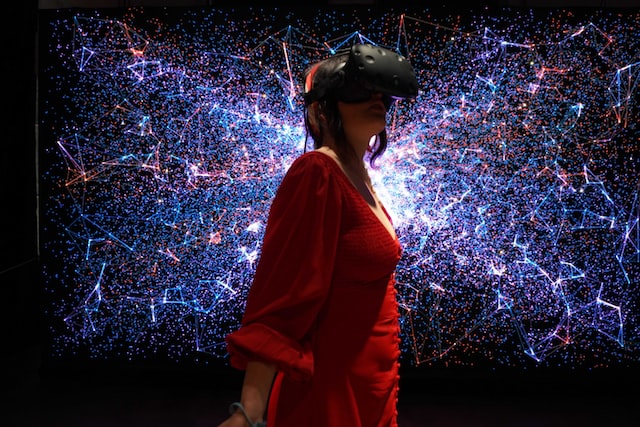Virtual Reality (VR) is a rapidly growing technology that promises to revolutionize the way humans interact with their environment. By immersing users in simulated 3D worlds, VR can be used to manipulate people’s perception and behavior, allowing them to explore new experiences and gain insight into how psychology affects our lives. This makes it an attractive prospect for psychologists who are looking for innovative ways to study the human mind.
In recent years, many studies have been conducted using VR technology to explore psychological phenomena such as memory, perception, and emotion. For instance, researchers can use virtual environments to test how people respond to different stimuli or how they react in stressful situations. In addition, VR can be used to simulate psychological disorders and treat symptoms, such as fear of heights or social phobia.
VR is also being explored as a tool for therapy. It allows therapists to create virtual scenarios in which patients can work through their issues without the fear of judgement or exposure that comes with traditional treatments. These scenarios can be tailored to the individual to make them as realistic as possible.
How VR is Being Used to Explore Psychological Phenomena

Virtual Reality (VR) is being used in psychology for a variety of purposes. It can be used to understand how people perceive and interact with their environment and how this affects their behavior. In addition, it allows researchers to explore psychological phenomena such as memory, perception, emotion, and social interaction.
Recent studies have demonstrated the potential of VR for exploring both normal and abnormal psychology. For instance, researchers have used virtual environments to evaluate how people respond to certain stimuli or the effects of stress on decision-making processes. Additionally, VR has been used to simulate psychological disorders such as phobias in order to better understand them and develop more effective treatments.
By immersing users in simulated worlds, VR offers unique opportunities for psychologists to gain insight into the workings of the human mind. It promises to revolutionize the field of psychology, providing new methods for research and treatment.
Examples of Studies Conducted Using VR Technology
There have been numerous studies conducted using VR technology to explore psychology. For instance, researchers at the University of Colorado used VR to study how people react to situations with different levels of risk in order to better understand the decision-making process. In another example, scientists at Oxford University used VR to investigate how virtual environments can be used to treat anxiety disorders such as post-traumatic stress disorder (PTSD).
Additionally, researchers are beginning to explore the potential of using VR for therapeutic purposes. For instance, a team from Harvard Medical School has developed an immersive virtual reality experience that allows patients with social anxiety disorder (SAD) to practice real-life scenarios without fear of judgement or embarrassment. Such approaches could revolutionize the way mental health conditions are treated.
Potential Applications of VR in the Field of Psychology
Virtual Reality (VR) has many potential applications in the field of psychology. It can be used to explore cognitive processes, such as memory, perception, and decision-making, as well as social dynamics and emotion. In addition, VR can provide a safe environment for researchers to study how people react to different stimuli or stressful situations.
Moreover, VR is being explored as a tool for therapy. By creating virtual environments that are tailored to the individual patient’s needs, therapists can help them work through their issues without fear of judgement or exposure. This could revolutionize mental health treatments by providing an effective alternative to traditional methods.
Finally, VR can also be used to simulate psychological disorders and treat symptoms such as fear of heights or social anxiety. This can provide a safe, low-risk environment for psychologists to test new treatments and gain insight into the causes of mental health issues.
Benefits of Using VR as a Tool for Therapy
VR presents numerous benefits when used as a tool for therapy. Because it can be tailored to the individual patient’s needs, therapists are better able to address their specific issues in an immersive virtual environment. Additionally, VR allows therapists to control the variables within an experience, ensuring that patients receive effective and targeted treatment.
Furthermore, because it is a low-risk environment, patients can practice different scenarios without fear of judgement or failure. This allows them to explore their emotions and reactions without feeling exposed or vulnerable.
Finally, VR can provide a more efficient form of therapy by enabling therapists to cover more ground in a shorter amount of time.
Challenges Faced by Psychologists When Utilizing VR Technology
Despite the potential of VR in psychology, there are a number of challenges that psychologists face when utilizing this technology. For instance, studies have shown that VR can cause motion sickness and feelings of discomfort in some users. This is an issue that must be addressed in order to ensure the safety and comfort of patients.
In addition, researchers must also consider the ethical implications of using VR technology as a tool for therapy. For example, it is important to make sure that virtual environments are realistic enough to provide effective treatment without being too overwhelming or triggering for certain individuals. Furthermore, therapists must also remain aware of possible bias or prejudice present in the simulations so as to avoid exacerbating existing issues.
Finally, cost can be another barrier to adopting VR as a tool for therapy, as the technology can be expensive to implement. Additionally, it is difficult to regulate virtual environments, making it important for therapists to remain vigilant when using this technology.
Conclusion: The Promise of Virtual Reality for Psychological Research and Treatment
Despite the challenges faced by psychologists when utilizing VR technology, its potential in the field of psychology is undeniable. Through creating virtual environments tailored to individual patients’ needs and controlling variables within an experience, therapists can provide effective and targeted treatment. Additionally, it provides a low-risk environment for exploring cognitive processes, social dynamics and emotions as well as simulating different psychological disorders.
As such, Virtual Reality has great promise for use in both psychological research and treatment. With continued development and refinement of this technology, the possibilities are limitless. It is clear that VR presents immense opportunities to revolutionize psychology for the betterment of mental health worldwide.

